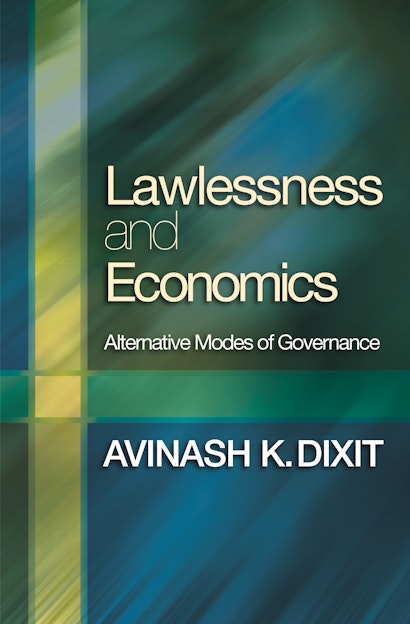How can property rights be protected and contracts be enforced in countries where the rule of law is ineffective or absent? How can firms from advanced market economies do business in such circumstances? In Lawlessness and Economics, Avinash Dixit examines the theory of private institutions that transcend or supplement weak economic governance from the state.
In much of the world and through much of history, private mechanisms—such as long-term relationships, arbitration, social networks to disseminate information and norms to impose sanctions, and for-profit enforcement services—have grown up in place of formal, state-governed institutions. Even in countries with strong legal systems, many of these mechanisms continue under the shadow of the law. Numerous case studies and empirical investigations have demonstrated the variety, importance, and merits, and drawbacks of such institutions.
This book builds on these studies and constructs a toolkit of theoretical models to analyze them. The models shed new conceptual light on the different modes of governance, and deepen our understanding of the interaction of the alternative institutions with each other and with the government’s law. For example, one model explains the limit on the size of social networks and illuminates problems in the transition to more formal legal systems as economies grow beyond this limit. Other models explain why for-profit enforcement is inefficient. The models also help us understand why state law dovetails with some non-state institutions and collides with others. This can help less-developed countries and transition economies devise better processes for the introduction or reform of their formal legal systems.
Avinash K. Dixit is John J. F. Sherrerd '52 University Professor of Economics at Princeton University. He is the author or coauthor of nine books, including Investment under Uncertainty (Princeton), Thinking Strategically (Norton), Games of Strategy (Norton), and The Making of Economic Policy (MIT).
"[In a] broad field that is by its very nature multidisciplinary, Lawlessness and Economics is very straightforward and comprehensive in its survey of this emerging and complex phenomenon. . . . Perhaps the most compelling attribute of this endeavor is Dixit's tenacious ability to place each section and his various models into a clear and precise context with the already vast literature."—Wesley T. Milner, Law and Politics Book Review
"Concise yet comprehensive, Professor Dixit's work may well become an essential handbook for this rapidly developing field of study."—Harvard Law Review
"Policy-oriented or not, scholars hoping to make a contribution in the area of governance in less developed countries would do well to begin with this brilliant book."—James E. Rauch, Journal of Economic Literature
"Avinash Dixit, a superb economist at the very peak of his profession, is one of the best-qualified economists in the world to write this book. With exceptional clarity he develops an elegant model of the scope of informal governance, one that will be indispensable for economists working in this area and for some political scientists as well."—James E. Rauch, University of California, San Diego
"A major contribution to the field. Avinash Dixit provides an accessible and well-written overview of a sort not previously available in book form, integrating theoretical and empirical findings and developing new aspects of the issue."—Avner Greif, Stanford University
"This extremely well written book presents a lucid and comprehensive survey of a new field in economics, namely the study of exchange, contracts, and property rights enforcement in the absence of a benevolent state. Besides providing a clear picture of the existing literature, it raises interesting questions in a coherent framework—pointing to exciting new avenues of research."—Oriana Bandiera, London School of Economics

